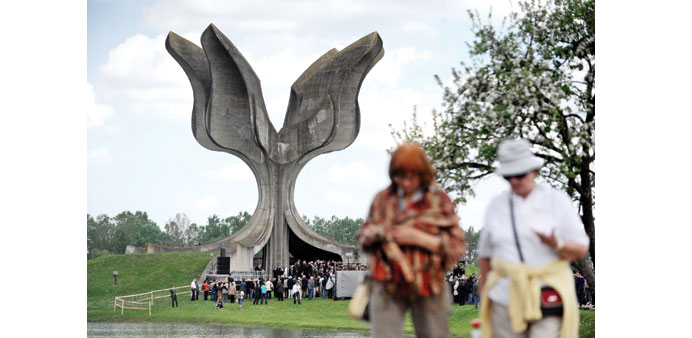Croatia commemorated yesterday the tens of thousands of victims, mostly Serbs and Jews, killed by the country’s pro-Nazi World War II regime at a notorious concentration camp dismantled 70 years ago.
Several hundred people, including survivors of the Jasenovac camp, victims’ relatives, officials, religious leaders and foreign diplomats gathered for a multi-denominational service and wreath-laying ceremony at the camp site.
“The horrors of Jasenovac warn us ... not to allow discrimination and persecution based on national, religious, ideological or gender differences ever again,” parliamentary Speaker Josip Leko said.
Prime Minister Zoran Milanovic said the country, which has been independent since 1991, had distanced itself in its constitution from the pro-Nazi Ustasha regime which set up the camp in 1941.
Underlining the role of Croatian anti-fascist partisans during WWII, he added: “There was only one Croatian army during World War II and these were Croatian partisans.”
The ceremony marked the 70th anniversary of an attempted escape by around 600 inmates from the camp. Only around 90 survived, with the others killed by guards.
The ceremony at Jasenovac, known as “Croatia’s Auschwitz” – a reference to the Nazi death camp in Poland – is held every year on the Sunday closest to April 22, the day of the escape in 1945.
The camp, around 100km southeast of Zagreb, was dismantled a few days after the failed breakout.
The Ustashas, who ran the so-called Independent State of Croatia (NDH) detained and killed tens of thousands of Serbs, Jews, anti-fascist Croatians, gypsies and others in concentration camps.
The Jasenovac complex was the largest and most notoriously brutal of Croatia’s camps, with many inmates killed by hammers, knives and stones.
During a visit to Jasenovac in 2010 the then Israeli president Shimon Peres said the way victims were killed there was a “demonstration of sheer sadism”.
The total number of people killed at the camp remains disputed, varying from 80,000 dead according to Croatia, to 700,000 dead according to Serbian figures.
The United States Holocaust Memorial Museum estimates that around 100,000 people were murdered there.
Dinko Sakic, a former Jasenovac camp commander, was in 1999 sentenced to 20 years in prison for crimes against humanity after being extradited from Argentina.
He was found guilty for the deaths of no less than 2,000 inmates.
Sakic died in a Croatian prison in 2008.

People attend a ceremony in Jasenovac for the thousands of victims who died at the Jasenovac camp.
